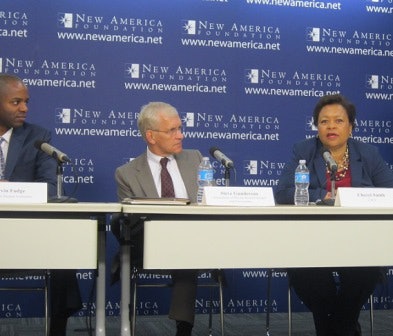 Kevin Fudge of American Student Assistance, Steve Gunderson of the Association of Private Sector Colleges and Universities and Cheryl Smith of the United Negro College Fund discuss Parent PLUS loan reform. (Photo by Ronald Roach)
Kevin Fudge of American Student Assistance, Steve Gunderson of the Association of Private Sector Colleges and Universities and Cheryl Smith of the United Negro College Fund discuss Parent PLUS loan reform. (Photo by Ronald Roach)
From October 2011 to October 2012, the rejection rate for PLUS loans jumped from 28 to 38 percent, and the loan denials disproportionately affected students attending for-profit schools and historically Black colleges and universities (HBCUs).
Although HBCUs leaders have been publicly critical of the U.S. Education Department for tightening credit check criteria for Parent PLUS loan applicants, a new report released by the New America Foundation Wednesday is urging new reforms to ensure that the program does not burden parent borrowers with debt they cannot pay back. Next month, the Education Department begins negotiations with higher education organizations over changes to the eligibility requirements to Parent PLUS Loans.
“The Department was right in trying to prevent parents from borrowing loans they might not be able to afford … If anything, the Department’s changes were too modest,” according to the New America Foundation’s “The Parent Trap: Parental PLUS Loans and Intergenerational Borrowing” report.
The report’s author, Rachel Fishman, a policy analyst in the foundation’s Education Policy Program, said Wednesday during the “Parent PLUS or Minus: Promoting or Putting Parents at Risk?” forum that despite the U.S. Education Department’s poor handling of credit check changes the move represented a step in the right direction.
“Without a doubt, as I was reading all these anecdotes and hearing from HBCUs and students, implementation of the credit change was totally bungled,” by the U.S. Education Department, she said.
“It left students scrambling in the middle of their academic careers with trying to find the funds to remain in school and that never should have happened. But the underlying motivation of the department was strong,” Fishman told the nearly 100 people who attended the forum in downtown Washington.




















